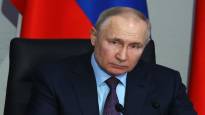The pressure against Russia is increasing due to the report of the Organization for Security and Cooperation in Europe published today.
An OSCE team is reviewing Russia’s human rights violations and suspected war crimes in Ukraine in a report published Thursday. The main focus of the report is on the forced transportation of Ukrainian children to Russia.
We asked the political advice of the Finnish OSCE mission From Sebastian Gahnströmwhat new information does the report tell about Russia’s activities in Ukraine.
What are the main points of the report?
– The report is a fairly accurate and careful assessment of the situation, but yes, here we come to the conclusion that Russia has clearly violated both international humanitarian law and international human rights, says Gahnström.
According to Gahnström, in some cases rights have been blatantly violated and some of the acts are war crimes.
– The report does not directly take a position on whether it is crimes against humanity, because that decision is the responsibility of the International Criminal Court, says Gahnström.
However, the authors of the report found indications of crimes against humanity. On what grounds can this be said?
– Forced relocation is a crime against humanity if it is committed as part of a large-scale attack against the civilian population. According to the report, the identifiers are fulfilled, but we still need to know who is guilty of this activity, says Gahnström.
Last year’s Russia was difficult, but it was possible to negotiate with it. What does the report mean for Russia’s OSCE membership?
Ukraine has brought up Russia’s expulsion from the OSCE, but the organization itself is unable to expel anyone.
– The only way would be for Russia to voluntarily leave the organization, says Gahnström.
According to him, the report does not directly mean anything for Russia’s membership, but the pressure on the country will certainly increase.
Russia is unlikely to leave the organization. However, the report is yet another proof of how Russia continues to flagrantly violate international law.
The report contains clear action instructions for Russia. How likely is it that Russia will follow them?
– Our hope is that reports like this lead to the pressure increasing and eventually Russia agrees to improve the situation.
According to Gahnström, the topic is sensitive and it has also attracted the attention of countries that may have previously supported Russia’s activities.
The report reveals details of Russia’s negligence. According to Gahnström, for example, Russia does not collect lists of children, so it is not known where the children are. It would also be important to let the ICRC, i.e. the International Red Cross, into the camps to carry out inspections.
The International Criminal Court ICC has issued a wanted notice for Russian President Vladimir Putin and Children’s Ombudsman Marija Lvova-Belova. What does this report do to hold Russia’s leadership accountable?
– This report adds information or improves the situational picture so that this would be useful in other processes, says Gahnström.
Gahnström thinks that the report will cause a strong reaction, and it will be kept on display as a reminder to Russia in the future.
The OSCE does not have the opportunity to decide on sanctions, for example.
– A strong response is expected from Russia, in which they deny everything, Gahnström estimates.
Also listen to World Politics everyday:
